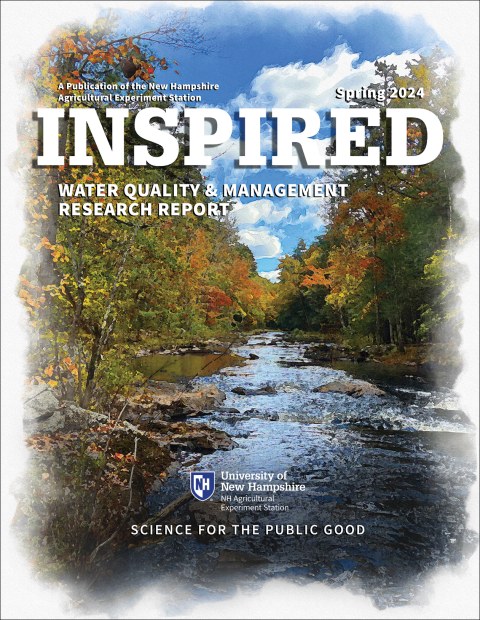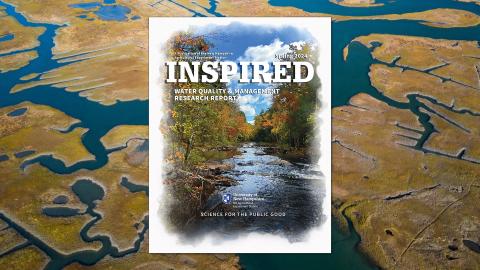Just Released: The NHAES Spring 2024 INSPIRED Research Report on Water Quality & Management

The New Hampshire Agricultural Experiment Station (NHAES) at the University of New Hampshire recently published its latest issue of the INSPIRED research report, highlighting the importance of sustainably managing New Hampshire’s freshwater resources for the benefit of all Granite Staters. The 11 research reports included in the Water Quality and Management issue offer an in-depth analysis of research focused on detecting and mitigating water pollutants; on innovative tools and methods for assessing water quality in the state’s lakes and rivers; and on how these freshwater bodies play a dynamic role in climate change, as well as how climate change is impacting them.
“Water is such a key resource for our state, and there are great ongoing efforts by our public agencies and governments, nonprofit organizations and landowners to protect our waters’ quality,” said Anton Bekkerman, director of the NHAES. “But with climate and economic uncertainties over the next 5, 10, 25 years, relentless scientific discovery is needed to ensure that the Granite State continues to be a responsible and cost-effective steward of our rivers, streams and lakes.”
New Hampshire is a state powered and supported by its freshwater bodies—from hydroelectric dams that harness river currents to rivers that provide food, support regional ecosystems, and drive local recreation, tourism and economies. The Granite State has more than 800 lakes and ponds and approximately 19,000 miles of rivers and streams, adding over $200 million from recreational fishing, attracting nearly half a million visitors to enjoy the state’s freshwater swimming and surrounding communities, and providing ecosystem services that ensure a clean drinking water supply, run-off water filtration, erosion management, resilient wildlife habitats and flood mitigation.
Highlighting Diverse Research Areas
The research in this latest issue of INSPIRED provides findings and perspectives about how innovation and discovery are used to protect water quality, remediate pollution and better understand the impacts on and of climate change. The research from contributing scientists provides findings about the effects of urbanization on water chemistry and the roles of plants, bacteria and their interactions on reducing the adverse effects of harsh chemicals entering the waterways; how cost-effective adaption to existing sensors and the use of increasingly available unmanned aerial systems can improve the accuracy in measuring water quality and the safety of those tasked with taking those measurements; and the roles that rivers are playing in their ability to capture carbon and methane, thereby preventing these gases from entering the atmosphere.
Each research article in this issue of INSPIRED offers a snapshot of the rigorous science and practical takeaways that can support efforts by landowners, agencies, nonprofits, and policy makers to make informed, tested decisions for managing the state’s and region’s water resources. By assessing new and emerging technologies, studying and adapting lessons from within New Hampshire and from far outside and leveraging insights from an increasing amount of and breadth of data, the discoveries from New Hampshire Agricultural Experiment Station scientists are rapidly enhancing the understanding of how one of the state’s most prized environmental and economic resources can remain resilient even in the face of an uncertain climate and future.
Engaging with the Full Report
We invite readers to explore these compelling studies in detail. The full digital version of the INSPIRED: Water Quality and Management Report report is available for download.
You can also stay informed about future editions and more by signing up for the NHAES newsletter.
